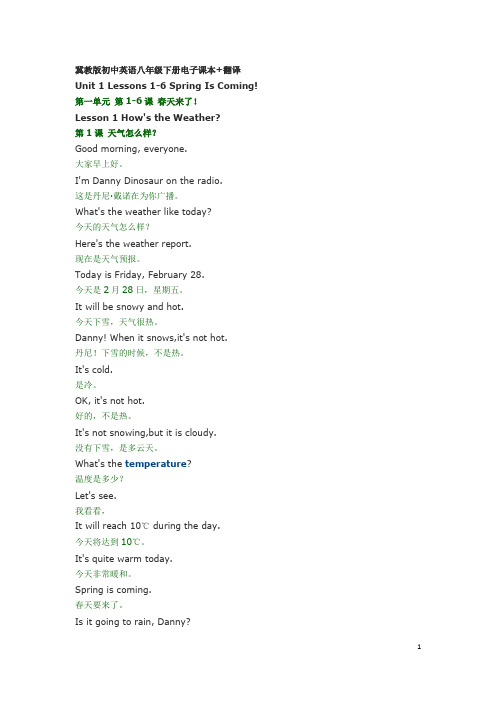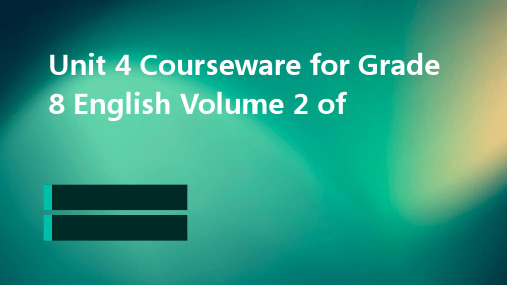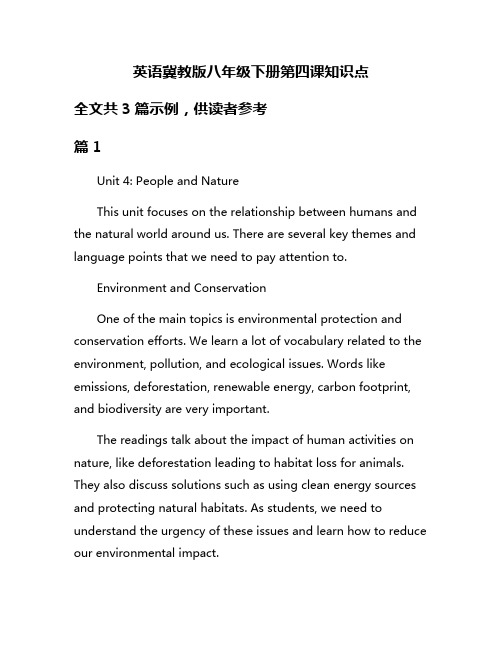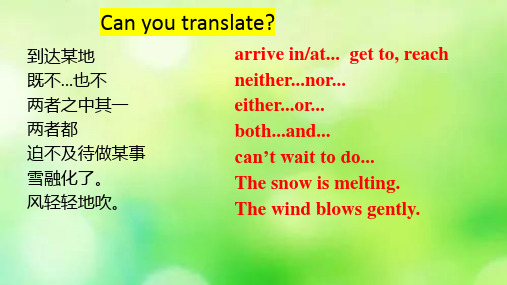八年级英语下册Lesson4教材内容详解冀教版
冀教版八年级下册英语冀教版八年级下册英语lesson4教案

后
反
思
e toThink About It!
Would you like to live in a place where there are no winters?
What do you enjoy most about spring?
Step2 New Words and Phrases
First,check the studentspreview about the new words and phrases in this lesson.Then,let the class read them after the teacher.
Step6Language Notes
1.long to do sth.“渴望做某事”long for“渴望;向往;盼望”,long for sth.“渴望某物”,
2.longfor sb.to do sth.“渴望某人做某事”
I’m longing to see you.
The children are longing for the holidays.
英语学科八年级集体备课教案
课题
Lesson 4 :The Spring City
课型
New
主备人
成员
教学目标
1.Master the new words and phrases in this lesson.
budding nearly millimeter plenty anytime long for all year round plenty of hundreds of
She longed for him to say something.
2.plenty of“许多;大量”,后可跟可数名词的复数形式和不可数名词,只用于肯定句中,在疑问句和否定句中many,much或enough。
冀教版初中英语八年级下册电子课本-翻译

冀教版初中英语八年级下册电子课本+翻译Unit 1 Lessons 1-6 Spring Is Coming!第一单元第1-6课春天来了!Lesson 1 How's the Weather?第1课天气怎么样?Good morning, everyone.大家早上好。
I'm Danny Dinosaur on the radio.这是丹尼·戴诺在为你广播。
What's the weather like today?今天的天气怎么样?Here's the weather report.现在是天气预报。
Today is Friday, February 28.今天是2月28日,星期五。
It will be snowy and hot.今天下雪,天气很热。
Danny! When it snows,it's not hot.丹尼!下雪的时候,不是热。
It's cold.是冷。
OK, it's not hot.好的,不是热。
It's not snowing,but it is cloudy.没有下雪,是多云天。
What's the temperature?温度是多少?Let's see.我看看,It will reach 10℃ during the day.今天将达到10℃。
It's quite warm today.今天非常暖和。
Spring is coming.春天要来了。
Is it going to rain, Danny?丹尼,是要下雨了吗?Yes!There will be a shower this afternoon.是的!今天下午会有雨。
Maybe there will be a thunderstorm.可能会有暴风雨。
I hope not!I'm scared of thunder!我希望没有!我害怕打雷!Wow! What strange weather!哇!这么奇怪的天气!Now talk about the sunrise and the sunset.现在说是太阳升起和落山的时间吧。
录制教学课件:Lesson4(冀教版八下)

Hale Waihona Puke Homework1.Write the words three times and read the passage again and again. 2.Talk about your favorite city and the weather in it or talk about the things in spring with your partner.
because of 由于) the heavy rain. 2.I was late _________(
3.Now I_________ am feeling like (感觉要) sleeping.
longs for 4.Everyone _________( 盼望) the summer holiday.
5.There are _________( hundreds of 数百) people dancing on the playground.
14
summary
Word:
budding nearly millimetre plenty anytime
Phrases: long for think of temperature because of
12
I .单项选择 1. They have planted four trees A. hundred B. hundred of
C. hundred of
D. hundreds
2. Children have fun ____ outside in spring. A. run B. runs C. running D. to run
8
Important sentences:
冀教版八年级下册英语Unit 4 Lesson 19 How Do You Use the 授课课件

invite sb . to . . . 邀请某人去……
Are you invited to Mary’s birthday party? 你被邀请参加玛丽的生日聚会了吗?
典例 —Whyareyousoexcited?
—
A
Nancyinvitedme_____onatriptoDongjiangLak ejustnow. [郴州]
1.Ifyouworkhard,you’ll____g_e_t__ (get) thereintheend. 2.Ifyoudon’tstophim,hewill_____p_l_a_y(play)gamesthe wholeday. 3.Ifit___r_a_in__s_ (rain) tomorrow,Dannywillnotgotothe supermarkettobuydonuts. 4.Ifyou__g_o_ (go) tobednow, I’llreadyouabedtimestory.
LearningTip Canyounamethepartsofacomputer?
1.keyboard 2. mouse 3. screen 4. monitor
Let'sDoIt!
1)Readthelesson. TickthethingsthatJennyand
ternet.
知识点 1 IliketousetheInternettoreadaboutsports andtechnology.
考点1 technology/tek'nɒlədʒɪ/n. 技术 考向 它为不可数名词。常用搭配:scienceandtechnology
科学技术informationtechnology信息技术 eg:Withthedevelopmentofscienceandtechnology,
Unit4冀教版英语八年级下册课文原文及翻译点 (中英文对照版)

冀教版英语八年级下册Unit4课文原文及翻译中英对照版Lesson 19 How Do You Use the Internet?你们怎么使用网络?How does the Interent help you,class?同学们,网络怎么帮助你们呢?I like to use the Internet to read about sports and technology.我喜欢用网络阅读体育和科技。
With the Internet, we can learn about almost anything.有了网络,我们可以学习更多的东西。
I used to have a desktop computer,but now I have a tablet.我过去有一个台式机,现在我有了一个平板。
It has no keyboard or mouse,so it is easy to carry.它不需要键盘或鼠标,所以拿起来很方便。
Now I can use the Internet anywhere!现在我随处可用网络了!I like chatting with my friends online.我喜欢和朋友在线聊天。
We use video chat!我们使用视频聊天!I use the Internet to blog about donuts.我用网络来写多纳圈的博客。
There are 500 people following my blog!我的博客有500个关注者!Some of us are planning to organize a Donut Club.我们中的一些人计划组织多纳圈俱乐部。
If we want to have a meeting,I can send the invitation online.如果我们想组织聚会,我可以在网上发布邀请。
It’s quick and easy.很方便快捷。
冀教版八年级下册英语第四课

long 动词 “渴望” long形容词 长的
long for sth. 渴望某物 long to do sth. 渴望做某事
plenty of “许多;大 量”
可数名词复数 不可数名词
相当于a lot of / lots of
We have plenty of time to finish the work.
LESSON 4
• The spring city
管瑶瑶
budding 正发芽的
nearly
几乎;差不多;将近
millimetre plenty
毫米;千分之一米 kilometre 千米
centimetre 厘米 丰富;大量
anytime
在任何时候;随便什么 时候
1. What do we think of spring?
fine warm weather clear, fresh air new life green plants budding trees
2. What’s the average winter temperature in my hometown?
15℃ 3. How much rain does the city get every year?
•
• 谢谢大家
year. 5. Why are there hundreds of flowers and trees anytime of the year? Because of the spring-like weather.
Everyone longs for spring. Spring is a short season in many places around the world. But in my hometown, it feels like spring nearly all year round
八下英语第四课翻译冀教版

八下英语第四课翻译冀教版Lesson 4 The Spring City第4课春城When we think of spring,想起春天,we think of sea son of fine warm weather and clear fresh air.我们就会想到一个美好而温暖的季节,有着干净清新的空气。
We think of new life green plants and budding trees all around us. 想到新生活,有绿色的植物,萌芽的小树围绕我们。
Every one longs for spring每个人都渴望春天。
Spring is a short season in many places around the world春天在世界上很多地方都是一个短暂的季节。
But in my hometown, it feels like spring nearly all year round.但是在我的家乡,似乎一年四季都是春天。
The weather here is neither too hot nor too cold这儿的气候不是太热也不是太冷。
The average winter temperature is 15°C冬天的平均气温是15°C。
In summer it never gets too hot在夏天,它从不会太热。
The average temperature is 24°C平均气温是24℃。
The city gets about 1 000 millimeters of rain every year这个城市的年降水量大约是1000毫米。
There's plenty of sun shine too,这儿还有充足的阳光。
with about 2250 hours of sunshine every year每年的日照时间大约2250小时。
冀教版英语八年级下册unit4课件

Students are given incomplete sentences and asked to complete them with the appropriate vocabulary words, promoting their ability to use the words in practical contexts.
及时反馈
在此添加您的文本16字
对学生的练习进行及时反馈,指出错误并给出正确答案 和解析,帮助学生更好地掌握阅读技巧。
Reading application
01
实际应用
02
通过阅读材料和练习,引导 学生将所学知识应用到实际生 活中,提高他们的英语实际应
用能力。
03
跨学科应用
04
将英语阅读与其他学科知识 相结合,引导学生将所学知识 应用到其他学科中,促进跨学
01 Unit Overview
Unit Theme
The unit theme is "Festivals and Celebrations". It focuses on different festivals and celebrations around the world, including traditional and modern festivals.
Paragraph Writing
Writing paragraphs that support main ideas and are
coherent.
Writing application
Real-World Application
Applying writing skills to real-world situations, such as writing emails, letters, reports, or essays for school or work.
Lesson4课件冀教版八年级英语下册

We feel like ____A____ some food and drink because we'll invite some friends _______ in a party. A. buying, to join B. to buy, joining C. buying, join 【点拨】feel like doing想做某事;
[ˈplenti] n. 丰富,大量
plenty of 大量的(可修饰可数和不可数名词)
budding adj. 正发芽的
nearly
adv. 几乎;差不多;将近 近义词:almost
millimetre n. 毫米;千分之一米 centimetre(分米), metre(米), kilometre(千米)
The weather here is neither too hot nor too cold. The average winter temperature is 15 ℃. In summer it never gets too hot. The average temperature is 24 ℃. The city gets about 1 000 millimetres of rain every year. There's plenty of sunshine too, with about 2 250 hours of sunshine every year. Because of the spring-like weather, you can find hundreds of beautiful flowers and trees anytime of the year.
5.大量的
英语冀教版八年级下册第四课知识点

英语冀教版八年级下册第四课知识点全文共3篇示例,供读者参考篇1Unit 4: People and NatureThis unit focuses on the relationship between humans and the natural world around us. There are several key themes and language points that we need to pay attention to.Environment and ConservationOne of the main topics is environmental protection and conservation efforts. We learn a lot of vocabulary related to the environment, pollution, and ecological issues. Words like emissions, deforestation, renewable energy, carbon footprint, and biodiversity are very important.The readings talk about the impact of human activities on nature, like deforestation leading to habitat loss for animals. They also discuss solutions such as using clean energy sources and protecting natural habitats. As students, we need to understand the urgency of these issues and learn how to reduce our environmental impact.There are also several examples of people and organizations working towards conservation goals which is quite inspiring. The Great Green Wall initiative in Africa aims to fight desertification by planting trees across the continent. Closer to home, we read about volunteers in our own province removing trash from rivers and beaches.Animals and Their BehaviorAnother focus is on different animal species and their unique behaviors. We learn fascinating facts about how animals adapt to their environments and interact with one another. From the complex social structures of elephants to the intricate construction of bird nests, the readings give us a glimpse into the incredible diversity of life on our planet.The unit also touches upon the dangers facing many species due to human activities and habitat loss. Understanding animal behavior can help us better protect vulnerable populations. Key vocabulary in this area includes terms like migration patterns, adaptation, camouflage, and endangered species.In the listening exercises, we hear people describing their encounters with animals in the wild which really brings these topics to life. Overall, this section aims to foster a sense of appreciation for the natural world and its inhabitants.Language PointsOf course, we cannot forget about the important language skills we need to master as well. There is a big emphasis on using descriptive language, especially related to nature. We learn how to construct vivid descriptions using adjectives, adverbs, and figurative devices like metaphors and personification.Comparing and contrasting is another recurring skill, such as discussing the similarities and differences between plant/animal species or different environmental issues. We need to link our ideas using appropriate transitional words and phrases.Finally, many of the readings are persuasive in nature, encouraging us to take action on environmental matters. We analyze the structure of these arguments and practice using persuasive language techniques like rhetorical questions, repetition, and emotive appeals.My ThoughtsOn a personal note, I find this unit incredibly relevant and important for our generation. Climate change and loss of biodiversity are some of the biggest challenges we will face. Learning about these topics from a young age will help shape our values and priorities as we grow older.While the facts can sometimes be distressing, I am inspired by the examples of people fighting to protect nature, whether it is an individual reducing plastic use or large-scale conservation projects. It shows that every action, no matter how small, can create positive change.I hope that my classmates and I can take these lessons to heart. Developing a love and respect for the natural world is crucial. We are inheriting this planet, so it is our responsibility to be good stewards of the environment. With knowledge and collective action, we can work towards a more sustainable future.篇2Unit 4: A Beautiful JourneyHey there! It's me again, your friendly neighborhood student, here to share my thoughts and notes on Unit 4 of our English textbook. Get ready for a wild ride as we embark on a "Beautiful Journey" through the world of language and culture!The unit kicks off with an engaging text titled "The Silk Road," which takes us on a captivating historical adventure. We learn about the incredible network of trade routes that connected the East and West, facilitating the exchange of goods, ideas, and cultures. From China to the Mediterranean, merchantsbraved treacherous terrains and hostile environments to transport precious commodities like silk, spices, and knowledge.One fascinating aspect we explored was the role of languages along the Silk Road. With so many diverse civilizations interacting, the need for effective communication became paramount. Imagine trying to strike a deal with a merchant from Persia while you only spoke Chinese! That's where the concept of a "lingua franca" comes into play – a common language used for trade and diplomacy. It's incredible to think that ancient traders were essentially multilingual negotiators!Moving on, we delved into the world of idioms and their cultural significance. Who knew that simple phrases like "let the cat out of the bag" or "a piece of cake" could have such intriguing origins? Learning idioms not only enriches our language skills but also provides a window into the customs and thought processes of different societies. It's like unlocking hidden cultural codes!But wait, there's more! The unit also introduced us to the art of storytelling and its role in preserving cultural heritage. We explored folktales and legends from various regions, each one offering a unique glimpse into the values, beliefs, and traditions of its people. From the clever trickster tales of West Africa to theenchanting myths of ancient Greece, these stories captivated our imaginations and sparked discussions about universal themes like courage, wisdom, and the triumph of good over evil.Speaking of themes, one concept that really resonated with me was the idea of cultural diversity and its importance in fostering understanding and harmony. We discussed how embracing different perspectives and acknowledging the richness of cultural expressions can lead to personal growth and a more inclusive society. It's a valuable lesson that extends far beyond the classroom walls.But let's not forget the linguistic gems we encountered along the way! We learned about the fascinating world of word formation, where seemingly unrelated words can share a common root or affix. Who knew that words like "automobile" and "biography" were essentially cousins in the linguistic family tree? It's like discovering hidden connections between seemingly disparate concepts.And let's not overlook the importance of mastering writing skills! We honed our abilities to craft well-structured paragraphs, use transitional devices effectively, and develop coherent arguments. These essential tools will undoubtedly proveinvaluable as we navigate the academic and professional realms in the future.Overall, Unit 4 was an absolute whirlwind of cultural exploration, linguistic adventures, and personal growth. From unraveling the mysteries of idioms to tracing the footsteps of ancient traders, we embarked on a journey that expanded our horizons and deepened our appreciation for the diversity that enriches our world.So, there you have it – a student's perspective on the key points from Unit 4 of our English textbook. I hope this little excursion has left you feeling inspired and eager to embark on your own "beautiful journey" of language learning and cultural discovery!篇3Unit 4 - A Brighter FutureHey there, fellow students! In this essay, I'll be breaking down the main ideas and grammar points we covered in Unit 4 of our English textbook. Get ready to dive into some fascinating topics and brush up on those language skills!The unit kicked off with a thought-provoking text about the impact of technology on our lives. We learned about both thepositive and negative effects of technological advancements. On one hand, technology has made our lives more convenient and efficient. We can now access information, communicate, and accomplish tasks with just a few taps on our devices. However, the text also highlighted the potential downsides, such as the risk of becoming overly reliant on technology and the potential negative impact on our social skills and face-to-face interactions.One of the key grammar points we studied was the use of the present perfect continuous tense. This tense is used to describe actions that started in the past and are still ongoing in the present. For example, "I have been learning English for five years." We practiced using this tense in various contexts, such as discussing our hobbies, habits, and personal experiences.Moving on, we explored the fascinating world of artificial intelligence (AI) and its potential to revolutionize various industries. We learned about the incredible capabilities of AI systems, such as their ability to process vast amounts of data, recognize patterns, and make predictions. At the same time, we also discussed the ethical concerns surrounding AI, such as the potential for job displacement and the need for responsible development and regulation.In our grammar lessons, we delved into the use of the future continuous tense. This tense is used to describe actions that will be in progress at a specific time in the future. For instance, "At this time next week, I will be taking my English exam." We practiced forming and using this tense in various contexts, such as discussing future plans, making predictions, and expressing expectations.Another fascinating topic we covered was the concept of a "smart city." We learned about the integration of advanced technologies, such as sensors, data analytics, and Internet of Things (IoT) devices, to improve urban infrastructure, services, and quality of life. From efficient traffic management to optimized energy usage and improved public safety, the possibilities of smart cities are truly exciting.In terms of grammar, we focused on the use of the present perfect tense. This tense is used to describe completed actions in the past, with a connection to the present. For example, "I have finished my homework." We practiced using this tense in various contexts, such as discussing achievements, experiences, and ongoing situations.Finally, we explored the idea of sustainable development and the importance of finding a balance between economicgrowth and environmental protection. We discussed the challenges posed by climate change, resource depletion, and pollution, as well as the potential solutions offered by renewable energy sources, eco-friendly technologies, and responsible consumption habits.In our grammar lessons, we revisited the use of modal verbs, such as "should," "must," and "could." These verbs are used to express obligation, possibility, and advice. For instance, "We should recycle more to reduce waste." We practiced using modal verbs in various contexts, such as discussing environmental issues, making suggestions, and expressing opinions.Throughout the unit, we also had the opportunity to enhance our reading, writing, listening, and speaking skills through a variety of engaging activities and exercises. We analyzed texts, participated in discussions, wrote essays, and practiced our pronunciation and fluency.Overall, Unit 4 was an insightful and thought-provoking journey. We explored fascinating topics related to technology, AI, smart cities, and sustainable development, while also strengthening our grammar skills and language proficiency. As we move forward, let's continue to embrace the power ofknowledge and language to understand the world around us and shape a brighter future for all.。
冀教版八年级英语下册Lesson 4精品课件

Keeping the garden tidy all year round can be hard work.
4. 几百人正处于危险中。 Hundreds of people are at risk.
5. 这瓶子差不多空了。 The bottle’s nearly empty.
long for all year round plenty of hundreds of nearly
3. There’s plenty of sunshine… plenty (of sth.) 大量,充足,众多 They always gave us plenty to eat. 他们总是给我们好多东西吃。
I have seen a lot of/lots of/plenty of/a great number of English films.
He walked slowly because of his bad leg. 他因为腿不方便而行走缓慢。
I. Fill in the blanks with the correct forms of the phrases in the box.
long for think of feel like because of
long for sb./sth., long (for sb.) to do sth. (尤指对看似不会很快发生的事)渴望
Lucy had always longed for a brother. 露西一直渴望有个弟弟。
I’m longing to see you Байду номын сангаасgain. 我渴望再次见到你。
winter
They are all beautiful, aren’t they?
八年级英语下册教学(冀教版,河北专版)Lesson4TheSpringCity教学设计

1.抄写本节课的生词和短语,并翻译成中文。
2.ቤተ መጻሕፍቲ ባይዱ习本节课的主要句子,并用英语写一篇关于北京的小短文。
3.选择一个北京的历史文化景点,用英语介绍其背景、特点和参观后的感受。
作业的布置旨在让学生在课后复习和巩固所学知识,同时提高他们的写作和表达能力。对于不同程度的学生,作业的难度也有所区分,以满足他们的个性化学习需求。
2.教师提问:“你们对北京了解多少?”,让学生分享他们已知的关于北京的信息。
3.教师总结并引出本节课的学习目标:通过英语学习,进一步了解北京的历史和文化。
(二)讲授新知
1.教师引导学生学习本节课的生词和短语,如“spring city”、“capital”、“historical sites”等,并讲解其含义和用法。
八年级英语下册教学(冀教版,河北专版)Lesson4TheSpringCity教学设计
一、教学目标
(一)知识与技能
本节课是冀教版八年级英语下册的第四课,主题是“The Spring City”,主要介绍中国的首都北京。通过本节课的学习,学生能够掌握以下知识点:
1.能够听懂、会说、会读本节课的生词和短语,如“spring city”、“capital”、“historical sites”等。
在教学评价方面,教师采用形成性评价和终结性评价相结合的方式。形成性评价主要体现在课堂活动中,教师对学生的发音、语法、表达等方面进行即时点评,给予鼓励和建议。终结性评价主要体现在作业和课堂展示方面,教师对学生的作品进行详细点评,给出客观、公正的评价。
四、教学内容与过程
(一)导入新课
1.教师通过展示北京的图片和视频,激发学生的学习兴趣,引出本节课的主题“The Spring City”。
Lesson4课件-冀教版英语八年级下册

Summary
Words: budding; nearly; millimeter; plenty; anytime Phrases: long for; all year round; plenty of; hundreds of Sentences: 1. But in my hometown, it feels like spring nearly all year
成百上千的 想到
感觉像
既不;也不 许多;大量
一年到头; 终年
由于
03
Speaking
Talk about spring in your hometown
Work in pairs. Talk about the spring in your hometown. (P9 let’s do it-4)
feel like
the average temperature
plenty of...
because of... 后接名词短语。因为,由于
hundreds of...
There’s plenty of sunshine too, with about 2250 hours of sunshine
Can you translate?
到达某地 既不...也不 两者之中其一 两者都 迫不及待做某事 雪融化了。 风轻轻地吹。
arrive in/at... get to, reach neither...nor... either...or... both...and... can’t wait to do... The snow is melting. The wind blows gently.
The average temperature is…
八年级英语下册Lesson4教材内容详解冀教版

Lesson 4:Sun Is Rising太阳在升起◆课文英汉对照Sun is rising,太阳在升起,Spring is ing,春天来了,Snow is melting,雪在融化,e with me.跟我来吧。
Climb the hillside,爬上山丘,Weather is warming,天气变暖,Wind blows gentlyThrough the trees.风轻轻地吹过树林。
One by oneThe flowers blossom, 花一朵一朵地绽放,Enjoy them one by one. 一个一个地欣赏着它们。
Sun is rising,太阳在升起,Spring is ing,春天来了,See it bringThe season’s change.看它带来了季节的变化。
LET’S DO IT!In a group of three, read the song aloud as a poem. Each of you should read one part.三人一组,把这首歌当作一首诗大声地朗读,你们每个人应当读一段。
How do you know when spring is ing? Talk with your partner about things like air, flowers and birds in spring.你怎么知道春天要来了?和你的同伴谈论一下这些事情,像春天的空气、花儿和鸟儿。
◆重点难点详解1. Spring is ing 春天来了,这个句子是用现在进行时态代替将来时。
在英语中,像这样可用进行时代替将来时的移动性动词有:e, leave, go, start, begin, fly等。
●My father is flying to Benjing tomorrow. 明天我的父亲要飞往。
●The train is ing. 火车就要到了。
冀教版英语八年级下册unit4课件教案.ppt

When did the modern
Olympics start?
.精品课件.
9
.精品课件.
10
[.设问导学,探究新知]:
Read the questions the text and answer 1.What do the five rings stand for? 2.What’s the Olympic motto? 3.What was the slogan for the 2008 Beijing Olympic Games?
.精品课件.
2
学习目标:
1.介绍奥林匹克运动会的发展及现状 2.关于奥运的新词汇的掌握
Champion
教学难点:
event用法的掌握
.精品课件.
3
自主学习
快速阅读课文并完成下列问题:
.精品课件.
4
the Olympic slogan
the ympic mascot
.精品课件.
5
合作学习
快速阅读课文并完成下列问题:
.精品课件.
13
【知识反馈】
Can you find the same or the different things in the modern Olympics?
.精品课件.
14
课堂小结:
• 1.识记本课出现的新单词America ,peace ,短 语:stay the same, take part in, stand for 等
.精品课件.
6
Five rings = Five
continents
Africa
Europ e
冀教版八年级英语下册Lesson 4 The spring city课件

long for, think of, nearly, because of, plenty of 1.Mike didn’t go to the park _b_e_c_a_u_se__o_f his illness. 2.Lucy always _th_i_n_k_s_o_f_ her father when she is in
because of + 名词或/代词/短语 because + 句子 因为生病,我没有去上学。
_I _d_id_n_’_t_g_o_t_o_s_c_h_o_ol_b_e_c_a_u_s_e_I_w_a_s_i_ll_. _____
=_I_d_i_d_n_’t_g_o__to__sc_h_o_o_l _b_e_ca_u_s_e_o_f_m__y_i_ll_n_es_s_.
Let’s do it 3
Exercises
1.欢迎任何时候来北京。
Welcome to Beijing _a_n_y_t_im__e__. 2.你能想出一个单词吗?
Can you _t_h_in_k__ ___o_f__ a word. 3. 李明因为腿脚不方便而行走缓慢。
Li Ming walked slowly _b_e_c_a_u__se_ _o_f__ his bad leg.
feel like + 名词,意为_感__觉__好__像_…__…___ 或__摸_起__来__像__是_…__…
feel like + doing = want to do
意为__想_要__做__…__…______
It feels like rain soon. _好__像_马__上__就__要__下_雨__了_____。 The stone feels like a potato. _这__块__石__头_摸__起__来__好__像_土__豆___。 I don’t feel like eating today. _今__天__我__感_觉__不__想__吃__饭______。
- 1、下载文档前请自行甄别文档内容的完整性,平台不提供额外的编辑、内容补充、找答案等附加服务。
- 2、"仅部分预览"的文档,不可在线预览部分如存在完整性等问题,可反馈申请退款(可完整预览的文档不适用该条件!)。
- 3、如文档侵犯您的权益,请联系客服反馈,我们会尽快为您处理(人工客服工作时间:9:00-18:30)。
●Ilike fishing.The fish is fun.我喜欢钓鱼。鱼很有趣。
⑵名词和形容词之间的相互转化。
wrong错误n.→wrong错误的,不正确的adj. right右边n.→right对的adj.
天气变暖,
Wind blows gently
Through the trees.
风轻轻地吹过树林。
One by one
The flowers blossom,花一朵一朵地绽放,
Enjoy them one by one.一个一个地欣赏着它们。
Sun is rising,
太阳在升起,
Spring is coming,
LET’S DO IT!
In a group of three, read the song aloud as a poem.Each of you should read one part.
三人一组,把这首歌当作一首诗大声地朗读,你们每个人应当读一段。
How do you know when spring is coming?Talk with your partner about things like air, flowers and birds in spring.
⑴名词和动词之间的相互转化。
watch观看,注视v.→手表n. water水n.→浇水v.
fish鱼n.→钓鱼v. hand手n.→递v.
●Iam watching my new watch.我在看我的新手表。
●He handed his English paper to my hand.他把英语作业递到了我的手里。
●The weather is very warm in spring in my hometown.在我的家乡春天很温暖。
归纳总结:
在英语中,还有很多形容词发生词性变化,而变成动词。
slow慢的(adj.)→slow放慢,使……变慢(v.)
cold冷的(adj.)→clod变凉,使……变凉 (v.)
●He enjoys this game.他喜欢这个游戏。
知识拓展:
①enjoy oneself = have a good time = have fun玩得高兴
●We enjoyed ourselves in the park yesterday.昨天我们在公园里玩得很开心。
●We enjoyed ourselves during the summer holidays.我们在暑假期间玩得很高兴。
●My clothes are wet. My mother is drying them.我的衣服湿了,妈妈在把它们弄干。
●This is a dry summer.这是一个干旱的夏天。
⑷副词和形容词之间的相互转化。
enough足够地adv.→enough足够的adj. hard努力adv.→hard困难的adj.
●The train is coming.火车就要到了。
2.Snow is melting雪在融化
melt v.融化;溶化பைடு நூலகம்消散;消失
●The snow has melted.雪融化了。
●Salt melts in water.盐在水中溶解。
●The fog soon melted in the morning sun.在早晨的阳光下雾很快消散了。
—Yes. Everything has changed here.是的。这儿的一切已经改变了。
●Let’s change seats.让我们交换座位吧。
●Ihave no change about me.我身边没有零钱。
知识拓展:
change v.改变,改造;更换,变化
●—Wow, so many new houses!Ican’tbelieve that.It used to be a poor village.
哇,那么多的新房子!我不相信。过去它是一个穷村子。
你怎么知道春天要来了?和你的同伴谈论一下这些事情,像春天的空气、花儿和鸟儿。
◆重点难点详解
1. Spring is coming春天来了,
这个句子是用现在进行时态代替将来时。在英语中,像这样可用进行时代替将来时的移动性动词有:come, leave, go, start, begin, fly等。
●My father is flying to Benjing tomorrow.明天我的父亲要飞往北京。
②enjoy going sth.喜欢做某事
●Ienjoy listening to music.我喜欢唱歌。
●Ienjoy speaking English.我喜欢说英语。
友情提示:
enjoy后接动名词作宾语,不跟动词不定式,类似的动词(短语)还有:finish (完成),practise(练习),can’t help(禁不住)等。
●Li Ming is sitting on Zhang Hua’s right.李明坐在张华的右边。
●Your answer is right.Mine is wrong.你的答案是对的。
●Please be quiet.This is a reading-room.请安静,这是阅览室。
●Ilike living in quiet.我喜欢过安静的生活。
知识拓展:
melting adj.融化的;温柔的
●Speak in a melting voice.充满柔情地说。
3.Climb the hillside,爬上山丘,
⑴climb v.意为“爬”。
●The boy is climbing up the tree.那个男孩正朝树上爬。
●The cat managed to climb to the top of the tree.那只猫终于爬上了树梢。
春天来了,
See it bring
The season’s change.
看它带来了季节的变化。
图片译文:
Here is a field of purple flowers.They’re beautiful, aren’t they?But don’t pick them!
这里是一大片紫色的花。它们很美丽,是不是?但不要摘它们!
Lesson 4:Sun Is Rising
太阳在升起
◆课文英汉对照
Sun is rising,
太阳在升起,
Spring is coming,
春天来了,
Snow is melting,
雪在融化,
Come with me.
跟我来吧。
Climb the hillside,
爬上山丘,
Weather is warming,
辨析:cross, across与through
这三个词都有“穿过”的意思,但用法不同。
⑴cross和across的含义与on有关,表示动作从物体的表面上进行的,强调从一端到另一端,如:过河,过桥,过马路等。但二者词性不同,cross是动词,across是介词,cross =动词+ across。
●Go across the bridge.= Cross the bridge.走过这座桥。
5.Wind blows gently through the trees.风轻轻地吹过树林。
through prep.意为“横过,穿过(指空间上)”。
●Light comes in through the window.光线从窗户射进来。
●The river flows through the city from west to east.那条河从西到东流过城市。
⑵climb n.意为“登山,攀登”。
●After two hours’climb, we succeeded.经过两个小时的攀登,我们成功了。
4.Weather is warming天气变暖
warm此处为动词,意为“变温暖,变暖和;把(食物)重新煮热;使……暖和;同情”
●Please warm up the dish over the stove.请把菜放在炉子上热一下。
●The sight of the happy children warmed his heart.看到幸福的孩子们他心中感到热呼呼的。
●My heart warms to him.我对他生了好感。
知识拓展:
warm温暖的,暖和的;热情的;亲切的
●We received a warm welcome.我们受到了热烈欢迎。
●Be careful when you cross the street.=Be careful when you go across the street.
当你穿过街道时要当心。
●Let’s help push the cart across the bridge.我们帮着把车子推过桥吧。
⑵through是介词,意为“横过,穿过(着重指动作从某一物体的内部空间进行的,含义与in有关)”。
⑶动词和形容词之间的相互转化。
clean打扫v.→clean干净的,清洁的adj dry把……弄干v.→dry干的adj.
●The students have cleaned the classroom carefully.The classroom is very clean now.
学生们已经仔细地打扫完教室。现在教室很干净了。
●Slow down, please. I won’t catch upwith you.请慢一点,我追不上你了。
●I putsome soup to the yard to cold it quickly.我把汤放在院子里,好让它快点凉。
